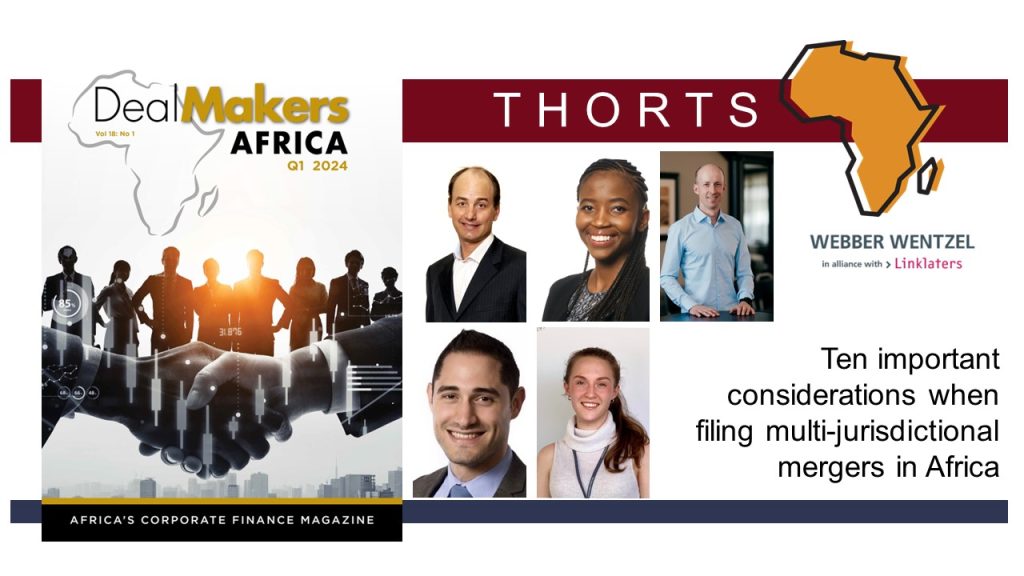Webber Wentzel and RBB Economics recently advised on two transactions that featured unprecedented levels of antitrust scrutiny across multiple African countries. The first transaction involved Dutch brewer, Heineken‘s acquisition of a controlling interest in Namibia Breweries, and the flavoured alcoholic beverages, wine and spirits operations of Distell. The second transaction involved Dutch coatings manufacturer, Akzo Nobel (which manufactures the well-known Dulux paint brand) acquiring Japanese coating manufacturer, Kansai Paint’s two African entities, one of which owns the Plascon brand.
Navigating complex regulatory requirements, each merger underwent competition assessment before various competition authorities in over 20 jurisdictions, a process that spanned at least 18 months from the risk assessment phase to litigation. The in-depth scrutiny and rigorous assessments by African competition authorities signal a positive welcome to the modernisation of African antitrust regimes. This mirrors the evolution of European competition law three decades ago, and we anticipate this positive trend to solidify further.
These transactions serve as useful case studies that offer insights into critical procedural and strategic considerations, which are important for businesses to keep in mind for future transactions that require merger filings across Africa.
CONSIDERATIONS FOR NAVIGATING COMPLEX MERGERS ACROSS AFRICA
Early risk assessment
The first step is for a business’ economics and legal team to conduct a preliminary risk assessment as soon as practicable, to identify potential substantive regulatory concerns, as well as to inform and develop a merger clearance strategy. This analysis should include identifying jurisdictions that may raise competition risks, public interest issues (such as job losses), and any potential structural and behavioural remedies.
The order of merger filings
To make informed filing decisions, parties must weigh the economic and commercial importance of the deal in each jurisdiction, the competition authority’s appetite to engage in substantive economic analysis, the complexity and resolution of competition issues, and the likelihood of public interest issues arising. While South Africa remains the likely focal point for the foreseeable future, the Common Market for Eastern and Southern Africa (COMESA) regional competition authority is playing an increasingly crucial role, due to its authority to assess the effects of a merger across 21 countries. Following Webber Wentzel and RBB Economics‘ extensive engagements with COMESA, it was observed that although the COMESA centralised filing process has cost-saving benefits, parties should expect increased complexity in the investigation process that follows. COMESA is adopting an increasingly rigorous approach when assessing the merger parties’ economic arguments and analysis. Allowance also needs to be made for the fact that COMESA has to engage with and secure input from all local authorities within the member states affected by the transaction, making for a lengthy and complex process. Some affected member states are inclined to request that the merger be referred to them. Typically, COMESA denies these requests and seeks to accommodate the concerns on the part of local competition authorities by allowing them to send information requests (while keeping COMESA in copy), and to hold meetings with the merger parties subject to a reporting obligation.
Managing the timing of multi-jurisdictional mergers
Ensuring a smooth timeline for a multi-jurisdictional merger across Africa requires meticulous time management. Firstly, factor in the extended review periods required by each jurisdiction where merger filings are required. Secondly, advisors must dedicate time and effort to collecting and analysing significant volumes of information and data, as well as engaging extensively with multiple stakeholders within the merger parties’ businesses (including the head office and local operations teams) to provide comprehensive and accurate responses to the various information requests from the competition authorities. It is also essential to build timing buffers into one long stop date to allow for unexpected delays, particularly in African countries where comprehensive information and data may not be readily available from the merger parties’ local operations.
Address any potentially negative optics/preconceptions upfront
Competition authorities are highly sceptical of transactions that involve well-known brands that appear to create or strengthen structural presumptions of market power. Early engagements with authorities can assist to:
(i) shift the debate towards substantive rather than ostensible issues;
(ii) establish the authority‘s appetite for more objective economic analysis; and
(iii) ascertain the need for a remedy if these presumptions seem insurmountable.
Build a strong merger rationale
At the outset, merger parties should develop and test a coherent and consistent strategic justification for the proposed transaction. It is advisable to involve the advisory team in conceptualising and testing the transaction rationale. In Webber Wentzel and RBB Economics‘ experience, a poorly articulated strategic justification (or no genuine justification at all) can unhelpfully detract from the substance of a case.
Have the right team to co-ordinate the various overlapping processes
Mergers spanning multiple African countries create a complex web of overlapping filing deadlines. This requires an advisory team with the depth of experience and size to prepare simultaneous submissions. The team must be prepared to meet specified deadlines and attend in-person meetings, site visits and public hearings across several jurisdictions.
Ensure consistency in merger filings
Competition authorities in Africa don’t operate in silos; they share information and reference each others justifications and decisions for guidance when evaluating mergers. This collaboration has several implications, but most importantly, it means that submissions across jurisdictions must be consistent in their content and underlying data. This ensures a clear and unified picture for the competition authorities involved. Among these regulators, COMESA and the South African, Namibian and Botswanan Commissions, in particular, are known for their active information exchange (while adhering to confidentiality restrictions).
Increasing levels of scrutiny from competition authorities
African mergers are being confronted by an ever-increasing level of scrutiny, necessitating a well-developed response strategy. Beyond the initial submissions, competition authorities are also increasingly inclined to conduct in-depth assessments and investigate complex theories of harm. This includes non-horizontal theories of harm initiated by third parties, such as customers and intervenors. Furthermore, authorities are no longer prepared to rely only on information provided by merging firms and will look to corroborate or refute these with evidence from third parties (or desktop research).
Public interest is becoming more relevant
African competition authorities are following in the footsteps of South African precedent. They are seeking to negotiate public interest commitments (such as moratoriums on job losses and requiring local procurement and supply commitments). Unfortunately, this is the case even when they are dealing with mergers with very limited competition concerns. It is helpful to consider, well in advance, how you plan to address anticipated requests for public interest commitments. It should also be borne in mind that conceding to proposals in one country might invite requests for similar remedies in other countries, which can become costly and difficult to implement.
Remedy design should align with the economic evidence
When designing a remedy, it is vital to consider its substance, implementation, commercial feasibility, and flexibility across jurisdictions. Remedies in multi-jurisdictional transactions may have a geographical component because of the businesses’ cross-border operations and the market definition adopted in the filing (e.g. regional markets may require regional remedies). Furthermore, African competition authorities are becoming increasingly aware of how a remedy in one country affects another, and they might adjust your proposed remedies accordingly.
While Africa continues to offer attractive commercial opportunities, if regulatory approvals are required to realise these opportunities, it is important to heed the necessary procedural and strategic considerations. Securing and retaining legal advisors with experience in multi-jurisdictional African filings from the very beginning is crucial. Their expertise can streamline the efficiency of the approval processes. Furthermore, securing legal advisors at an early stage also ensures that your internal strategic documents align with the narrative required to support approval for the merger filing.
Martin Versfeld is a Partner and Lebohang Makhubedu, a Senior Associate | Webber Wentzel. Patrick Smith is a Partner, Ricky Mann, an Associate Principal, and Daniela Lamparelli, a Senior Associate | RBB Economics

This article first appeared in DealMakers AFRICA, the continent’s quarterly M&A publication.
DealMakers AFRICA is a quarterly M&A publication
www.dealmakersafrica.com



